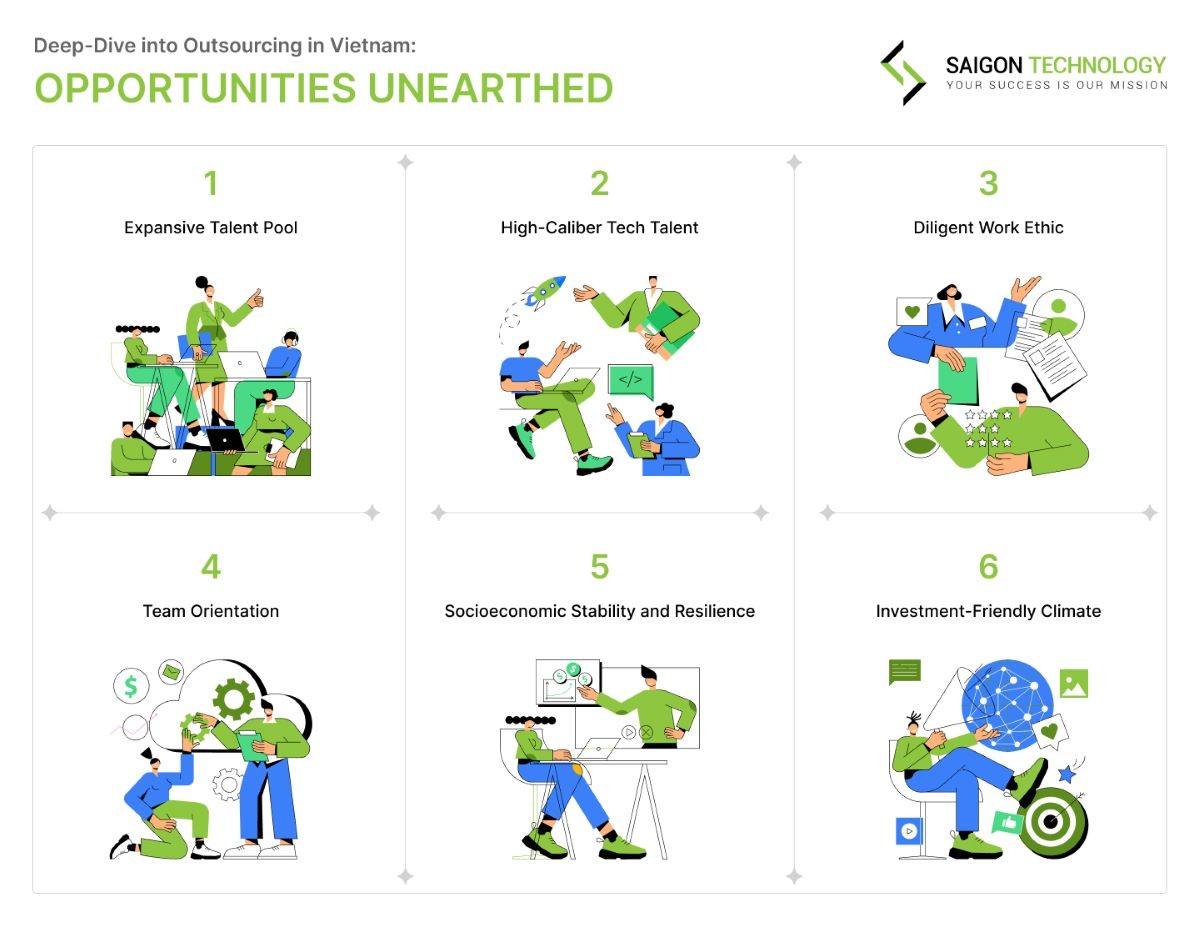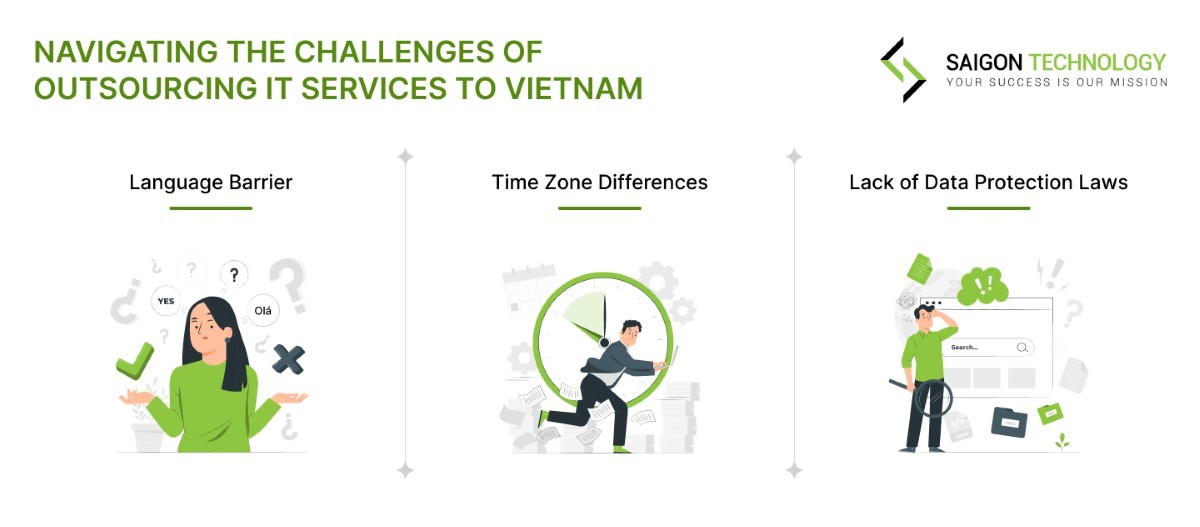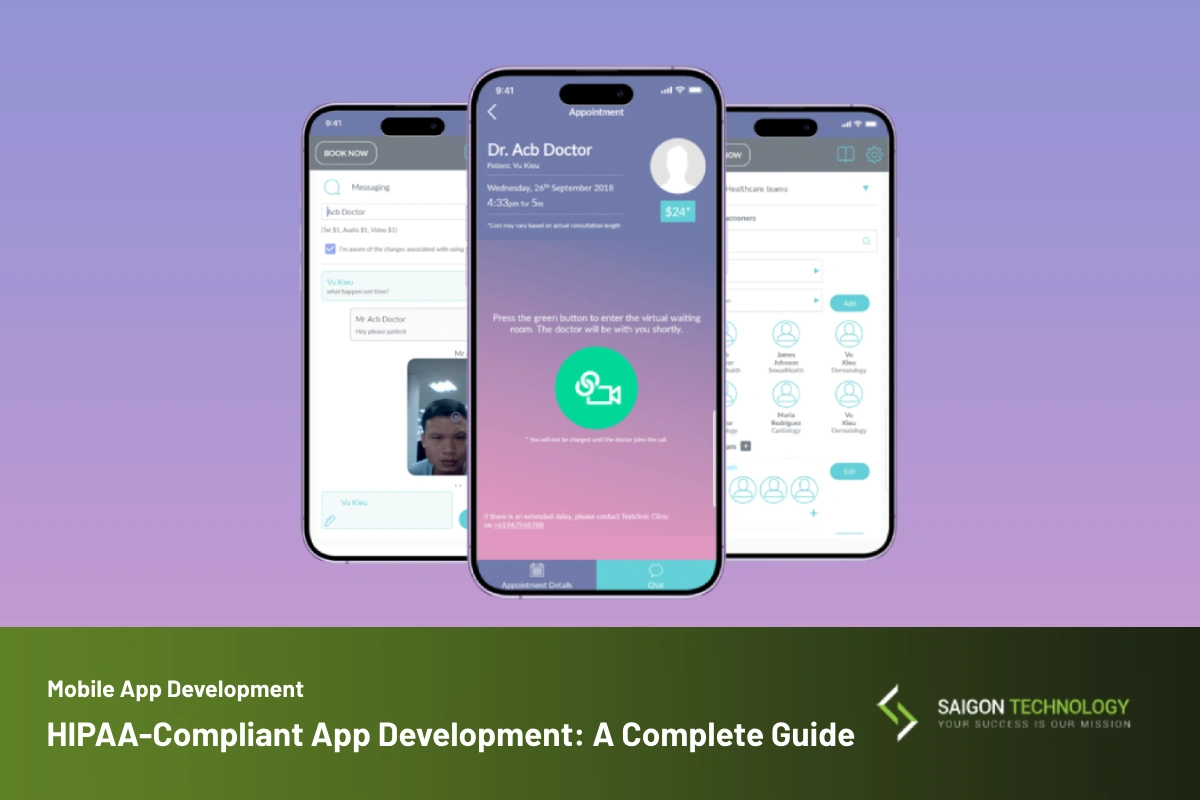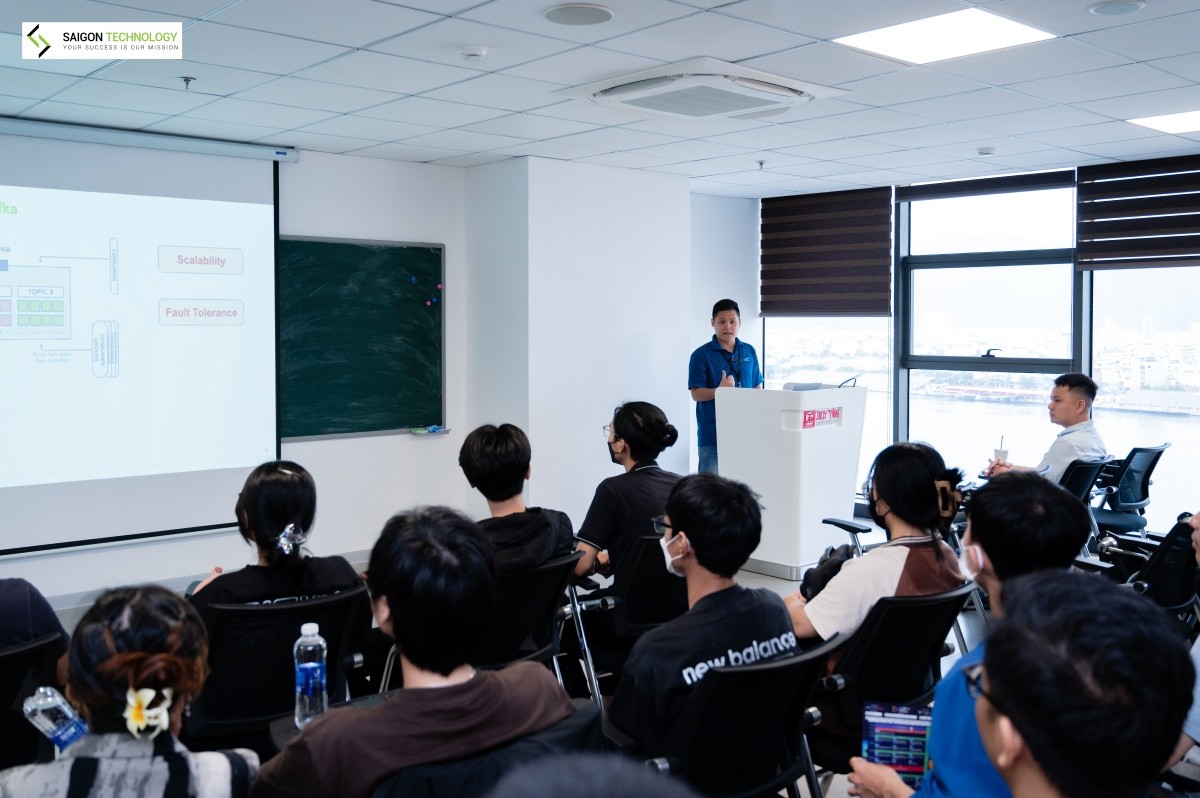In the bustling landscape of global tech development, outsourcing has emerged as a strategic pivot for many businesses looking to harness international talent and cost efficiencies. We stand at the forefront of this shift, championing Vietnam as a hub of innovation and technical prowess.
Why Vietnam, you may ask? The country boasts a dynamic and fast-growing economy with a rich pool of young, agile, and tech-savvy professionals. The government’s fervent investment in STEM education has made the country fertile ground for technical expertise and cutting-edge skills.
At Saigon Technology, our philosophy is simple: we merge local expertise with global standards. Outsourcing to Vietnam with us ensures not only cost-effective solutions but also the infusion of relentless creativity and unwavering dedication to excellence.
It’s time to explore the untapped potential of Vietnamese talent. With us, step confidently into a partnership that redefines the boundaries of what’s possible in tech development outsourcing.
Embark on Outsourcing to Vietnam at a Glance
Vietnam’s emergence as a prime destination for outsourcing to Vietnam is no mere coincidence. Its strategic location in Southeast Asia, coupled with a favorable timezone that aligns comfortably with major business capitals, makes it an outsourcing powerhouse. With a population surpassing 98 million and a GDP that showcases steady growth, Vietnam’s economic landscape is ripe for foreign investment.
Central to the Vietnam outsourcing industry is its main industry: technology. The nation is rapidly becoming a beacon for IT services, leveraging a young and educated workforce with a median age of 32 years. This demographic is not only tech-fluent but also highly adaptable and proficient in English, bridging communication gaps often faced in outsourcing.
The most popular services within the Vietnam outsourcing market range from software development to customer service and back-office support. Businesses around the globe are taking notice, tapping into the vibrant, cost-effective, and skill-rich environment that Vietnamese outsourcing offers. With outsourcing to Vietnam, companies find a harmonious blend of quality, efficiency, and innovation.
IT Outsourcing in Vietnam: Poised for Exponential Growth
Vietnam is rapidly ascending as a global outsourcing hub, with the outsourcing software development in Vietnam industry showing remarkable promise. The nation’s Vietnam IT outsourcing market is expected to hit US$590.40m in revenue for 2023, with an anticipated compound annual growth rate (CAGR) of 16.77% through to 2028, culminating in a projected market volume of US$1,282.00m.
Notably, the Vietnam outsourcing landscape is becoming increasingly competitive on the world stage, especially when compared to the dominance of the United States, which is poised to generate US$167.90bn in 2023. One standout statistic within the outsourcing to Vietnam market is the Spend per Employee, projected to reach US$10.03 in 2023, indicative of a highly cost-effective workforce.
The accelerating digitalization, the adoption of enterprise applications, and the shift to remote work setups have significantly spurred the growth of the outsourcing industry in Vietnam. Large and mid-sized companies, particularly from sectors such as telecommunications, finance, e-commerce, and manufacturing, are increasingly outsourcing IT support, infrastructure management, and business application operations.
The surge in demand for IT experts, due to a global talent shortage driven by demographic shifts and skill demands, positions the Vietnam outsourcing sector as a strategic partner for global businesses. This scenario is set to bolster the Vietnam outsourcing market as companies globally seek to focus on core functions while optimizing costs through outsourced IT solutions.
As the biggest contributor to revenue in the IT Services market, IT outsourcing’s global stature is undeniable, with revenues reaching US$361 billion in 2021 and forecasts suggesting a rise to US$777.8 billion by 2028. In this thriving environment, outsourcing to Vietnam emerges not just as a cost-effective alternative but as a strategic imperative for businesses aiming to stay agile and competitive in a digital-first world.
Navigating the Booming IT Outsourcing in Vietnam Market: Insights for CXOs
Vietnam is becoming an epicenter for IT outsourcing, with the industry anticipated to burgeon at a 16.77% growth rate through 2028. This surge is attributed to the convergence of affordable labor costs and a burgeoning pool of technical talent, compelling multinational corporations to seek Vietnamese shores for outsourcing endeavors.
– Unveiling the Dynamics of the Vietnam Outsourcing Market
Situated in the heart of Southeast Asia and operating within the Indochina Time Zone (GMT +7), Vietnam hosts a population of 98 million with a GDP that stands at $449.09 billion. The nation’s primary industries span electronics, steel, food & beverage processing, agriculture, and travel & tourism. Despite its fast-paced growth, Vietnam remains an economically accessible hub, attracting global businesses eager to harness its outsourcing potential.
In the realm of business outsourcing, which is increasingly becoming a norm, with 90% of US businesses considering it strategically viable, Vietnamese firms offer a plethora of services ranging from HR and payroll to IT outsourcing, accounting, finance, and customer service.
– The Trajectory of Outsourcing in Vietnam
With the IT industry amassing revenues of $139 billion in 2021—a stark doubling from 2016—the country’s global reputation as a technology hub is solidifying. This is reinforced by significant investments from tech titans like Intel, IBM, Samsung, and Microsoft. The country’s impressive 6th rank in Kearney’s 2021 Global Service Location Index underscores its prowess in software outsourcing based on financial attractiveness, available skills, business environment, and digital resonance.
The Vietnamese IT sector is characterized by:
- A robust IT workforce of 530,000 engineers
- A preference for languages like JavaScript, Java, PHP, C#/.Net, Python, Swift and Objective-C
- Dominant IT roles in backend, full-stack, frontend development, Android, iOS, Product/ Business Analyst, Project Manager/ Scrum Master, Tester, QA/QC
- A service array in eCommerce, Fintech, car/food ordering, software outsourcing, and BPO
- The Tech Talents Hiring Landscape challenges are currently addressed by continuously expanding talent pools, training and development investments, and recruitment analytics.
– Opportunities in Outsourcing to Vietnam
The drive for digital transformation spurs businesses toward cost-effective strategies, with outsourcing to Vietnam offering a financially appealing solution. Vietnam’s outsourcing cost benefits starkly contrast with those of other popular locales like India, the Philippines, China, and Ukraine.
In this intricate tapestry of economic, cultural, and technological factors, outsourcing to Vietnam presents a landscape ripe with opportunities for global businesses. The prospect of engaging with Vietnamese IT professionals is not only financially sound but also promises access to a workforce that is skilled, adaptable, and ready to meet the digital demands of the future.
Insight into Harnessing the Power of Vietnam’s Outsourcing Industry
Vietnam’s rapid ascent in the outsourcing industry in Vietnam has placed it among the most favorable destinations for international companies looking to optimize their operations. Understanding the advantages of outsourcing to Vietnam can unveil why it’s a strategic move.
Price Advantages in Vietnam Outsourcing
Economical labor is one of Vietnam’s strong suits. Businesses can save substantially when they opt for Vietnam outsourcing, with costs significantly lower than in traditional outsourcing hubs. Labor expenses in Vietnam are 90% less than in the U.S., offering substantial room for reallocating the budget toward development. This competitive pricing has placed Vietnam fifth on MarketsInsider’s list of the best countries to outsource to in recent years.
Labor Force: A Pillar of the Outsourcing Industry in Vietnam
Education is a top priority in Vietnam, a nation with a 96% literacy rate where government support propels the sector forward. Remarkably, 80% of college graduates hold degrees in scientific fields, fueling the outsourcing to the Vietnam sector with a tech-savvy workforce. A key fact that amplifies this advantage is the global exposure of Vietnamese IT talents, many of whom are integral parts of major tech giants like Google and Apple.
These experiences cycle back into the local talent pool, enhancing the nation’s capabilities in cutting-edge technologies. The IT sector is characterized by a youthful workforce and low turnover rates, especially when compared to other outsourcing nations. Such stability is a testament to the reliability that Vietnam outsourcing offers to its international partners.
Socio-Economic and Political Stability in Vietnam Outsourcing
In comparison to other Asian-Pacific outsourcing destinations, Vietnam stands out with its socio-economic and political tranquility. The absence of major ethnic or religious conflicts, alongside a consistent political landscape, contributes to a business-friendly environment. These factors, coupled with Vietnam’s success in managing economic challenges, including the COVID-19 pandemic, have fostered a stable climate for outsourcing to Vietnam.
Business Climate and Language Proficiency
Vietnam’s embrace of a free market and its strategic FTAs underscore its welcoming business conditions. The nation’s high English proficiency, particularly within the IT sector, ensures seamless communication for the outsourcing industry in Vietnam partners.
Vietnam’s steady growth, cost-effectiveness, highly skilled labor force, and stable environment collectively strengthen its position as a top destination for outsourcing. Businesses worldwide are increasingly turning towards Vietnam, leveraging these advantages to achieve efficiency and innovation in their operations.
Vietnam’s Ascent in Global IT Outsourcing: A Cost-Effective Hub for Tech Talent
A combination of youthful dynamism and strategic educational advancements marks Vietnam’s emergence as a potent force in IT outsourcing. The country has made a name for itself in the outsourcing to Vietnam landscape by:
- Harnessing the power of its youth, with a remarkable 70% of its population being young, energetic, and tech-savvy, ready to innovate and drive the IT sector forward.
- Leveraging substantial government investments in its IT education system, resulting in a workforce emanating from top-notch universities like the Ho Chi Minh City University of Technology, FPT University, and the Ho Chi Minh City University of Science. These institutions are renowned for cultivating a high-quality talent pool that’s ready to meet global IT demands.
- Demonstrating impressive growth metrics in the Information and Communications Technology (ICT) domain, with revenue reaching $148 billion in 2022 and a substantial year-on-year GDP contribution increase. Moreover, Ho Chi Minh City has gained recognition as a premier outsourcing to Vietnam hub, standing out in global indexes.
- Boasting a robust education system that prioritizes STEM and IT degrees, Vietnam produces a consistent stream of qualified IT professionals who are not only tech-savvy but also proficient in English and conversant with international business etiquette.
- Showcasing a large, educated talent pool, the country is an attractive destination for entities looking to hire developers in Vietnam. This demographic advantage is bolstered by a low unemployment rate and an annual addition of 400,000 IT engineers from 153 educational institutions.
- Witnessing a surge in the number of digital tech firms, which in 2022 alone, grew by 9.6%. This upsurge is coupled with a shift towards high-value processes in 60% of these companies.
- Achieving laudable rankings in global developer skills assessments, Vietnam stands 29th worldwide, shines as 3rd in Artificial Intelligence coding prowess, and holds the 11th spot for its coders’ skills globally, indicating the superior quality of its IT workforce.
- Attracting considerable foreign investment from high-tech giants like Qualcomm, Intel, Sony, and Samsung. This influx has resulted in solid hiring and research & development ventures within Vietnam, showcasing the country’s stability and growth potential in the IT domain.
- Offering compelling cost advantages, where the average hourly rate for software development stands competitively at around $25, significantly less than in other countries, which reinforces the value proposition of outsourcing to Vietnam.
- Being strategically positioned in Southeast Asia, Vietnam serves as a commercial nexus, providing businesses with an advantageous geographic location that acts as a bridge within the ASEAN region and beyond, enhancing its appeal as a global IT outsourcing hub.
Deep-Dive into Outsourcing in Vietnam: Opportunities Unearthed
Based on the above information, here are some opportunities that lie ahead in this sector:
- Expansive Talent Pool: With over 400 educational institutions churning out 57,000 tech graduates annually, the country’s digital tech firms employ a vast number of IT engineers. This growth trajectory hints at Vietnam’s potential ascent as a global tech powerhouse.
- High-Caliber Tech Talent: Skepticism about the quality of Southeast Asian tech work is dispelled by Vietnam’s ranking in various developer skills charts and surveys, reflecting the high proficiency of its developers.
- Diligent Work Ethic: Vietnamese professionals are recognized for their industrious nature and a strong inclination towards continuous learning and problem-solving—a crucial trait for outsourcing partnerships.
- Team Orientation: Essential for outsourcing, the workforce is noted for its strong team collaboration skills, which are pivotal for delivering successful project outcomes to global clients.
- Socioeconomic Stability and Resilience: Political stability and impressive recovery from the COVID-19 pandemic make Vietnam a reliable destination for outsourcing.
- Investment-Friendly Climate: The Vietnamese government’s liberal policies have attracted significant FDI, making the business environment conducive for companies seeking to outsource to Vietnam.
Navigating the Challenges of Outsourcing IT Services to Vietnam
Despite the allure of outsourcing to Vietnam, it’s important to acknowledge that there are inherent challenges in the region’s outsourcing sector:
Language Barrier
While Vietnamese software developers often use English as their working language with international partners, it is important to recognize that English is not their native tongue. This can lead to communication barriers, which is a notable difficulty when it comes to outsourcing to Vietnam.
To mitigate this, IT companies are making strides to improve English proficiency; for instance, at LTS Group, an English club and English-speaking days are initiatives that bolster language skills, with 86% of employees being able to communicate effectively in English. Clients are advised to ensure clear communication lines by vetting the language skills of their project leaders and preferring vendors with a proven track record of international collaboration.
Time Zone Differences
The time difference is a common outsourcing challenge, not exclusive to Vietnam. With Vietnam operating on GMT+7, coordinating with teams from the US or the UK can present logistical hurdles, especially when agile development models that require timely interactions are in play. To address this, clients might opt for a project-based approach to reduce the need for real-time communication or establish agreed-upon communication schedules to facilitate smoother collaboration despite the time zone differences.
Lack of Data Protection Laws
A significant concern for foreign entities considering outsourcing to Vietnam is the absence of a unified data protection law. Currently, Vietnam’s approach to personal data protection is fragmented across various decrees, regulations, and acts. This presents a risk for international companies that need assurance that their intellectual property rights will be safeguarded. This legal gap suggests a need for potential investors to conduct thorough due diligence and possibly seek additional legal agreements to ensure their IP and data remain protected when engaging with Vietnamese outsourcing providers.
Vietnam’s Outsourcing Landscape: A Rundown of Top Industry Titans
As the outsourcing industry in Vietnam continues to expand, several software development companies in Vietnam are setting benchmarks in the global IT space. The Software Outsourcing Journal has identified some of the leading firms in this sector:
1. Saigon Technology
- Hourly Rate: $30 – $49
- Employee Count: +400
- Locations: USA, Vietnam
- Expertise: Saigon Technology specializes in a comprehensive range of software outsourcing services. With a focus on AI and App Development, Cloud Migration, and DevOps, they have honed their skills to meet the intricate demands of a global clientele. Their proactive approach to adopting new technologies and a robust strategy for custom software development sets them apart in the industry. The dedication to delivering high-quality MVPs and offshore development services is evident in their sustained growth and presence in both the USA and Vietnam.
2. Techvify
- Hourly Rate: From $30
- Employee Count: +500
- Among Vietnam’s top IT outsourcing companies, TECHVIFY distinguishes itself through deep expertise in the manufacturing sector and a knack for delivering innovative, AI-powered solutions. Their portfolio boasts complex projects like collaborating with SP Group to develop Singapore’s first Digital Twins for the National Power Grid – an achievement that showcases their ability to solve high-impact, technical challenges. As a strategic tech partner to KPMG, TECHVIFY also helped bring a robust AI-powered Digital Assistant to life, streamlining workflows and enhancing enterprise productivity. Their commitment to security, scalability, and cutting-edge technology positions them as a trusted partner for organizations seeking advanced digital transformation.
TECHVIFY offers a comprehensive range of services designed to move businesses forward, including:
- AI Consulting
- Bespoke Software & App Development
- End-to-End Solutions Development
- Digital Transformation Consulting
3. TMA Solutions
- Hourly Rate: Undisclosed
- Employee Count: +1,000
- Established in 1997, TMA Solutions has steadily grown to become one of the leading software outsourcing service providers, with a large team that signifies a deep pool of talent. Specializing in custom software development and a commitment to software product development, TMA Solutions has built a reputation for delivering consistently high-quality web application development. Their expertise is augmented by a thorough selection and training process, ensuring their workforce is equipped with cutting-edge skills to tackle complex IT challenges.
4. KMS Technology Vietnam Co.
- Hourly Rate: Undisclosed
- Employee Count: +1,000
- KMS Technology Vietnam Co. integrates its technical expertise with a market-focused approach to drive product development and quality assurance. Recognized for their software development and testing services, they offer solutions that cater to speed-to-market without compromising on the standard of quality. KMS Technology takes pride in its ability to nurture innovation through its internal incubator, KMS Labs, which has been instrumental in launching successful software product companies. Their commitment to client success is evident in their comprehensive consulting services and the deployment of next-generation technology solutions.
5. NashTech
- Hourly Rate: $50 – $99
- Employee Count: +1,000
- NashTech is a company that delivers a wide range of product engineering solutions. Their teams are experts in using data, AI, and modern systems. They streamline and automate operations to help you meet your business goals. NashTech blends expert tech advice with seamless global product launches. They work closely with their development centers to deliver top solutions that prioritize your customers and help you achieve your business objectives.
Navigating the Decision to Outsource to Vietnam: A Strategic Guide for Companies
In today’s dynamic business landscape, the decision to outsource to Vietnam for IT needs hinges on several pivotal considerations. Vietnam has emerged as a significant player in the global outsourcing market, offering a compelling mix of skilled talent and cost-effectiveness that caters to a diverse array of IT requirements.
When assessing if and when to outsourcing to Vietnam, companies should analyze the following factors:
-
Project Scope and Complexity
Outsourcing to Vietnam might be the most beneficial for projects that don’t demand extensive complexity or large-scale team involvement. Vietnamese IT firms are adept at handling small to medium-sized projects that require a dedicated team of developers.
-
Communication and Cultural Fit
Engaging in outsourcing requires an understanding of the local culture. Vietnam’s work culture emphasizes respect and hierarchical structures, making it essential for companies to establish clear and respectful communication pathways to ensure mutual understanding.
-
Technical Skills and Expertise
With a burgeoning tech industry, Vietnam is home to a broad pool of developers proficient in web and mobile development, AI, and other leading technologies. Firms looking for specialized technical skills will find Vietnam a fertile ground for their outsourcing needs.
-
Cost
The competitive rates offered by Vietnamese software development services can lead to substantial cost savings for companies, making it an attractive destination for those looking to maximize their IT investment without compromising on quality.
Ultimately, companies poised to outsource to Vietnam should align this strategic move with their project requirements and business objectives. It is ideal for those with well-defined, manageable projects seeking cost efficiency without sacrificing developer expertise. By diligently assessing the capabilities of potential Vietnamese outsourcing partners, businesses can ensure a successful collaboration tailored to their specific IT needs.
Conclusion: Weighing the Prospects of Outsourcing to Vietnam
In the global IT landscape, outsourcing to Vietnam has become a strategic move for many businesses looking to leverage cost advantages and access a rich pool of technical expertise. While it presents a host of opportunities, like any business decision, it demands careful consideration of the potential challenges and a thorough assessment of the outsourcing partner’s capabilities. With a balanced approach, outsourcing to Vietnam can be a pivotal step towards achieving business efficiency and innovation.
FAQ: Navigating the Vietnam Outsourcing Landscape
1. What are the primary advantages of outsourcing to Vietnam?
Outsourcing to Vietnam offers several compelling advantages, including cost-effectiveness, a large pool of young and technically skilled labor, and a stable political environment conducive to business. The country’s government also actively supports the IT sector with policies that favor growth and investment.
Additionally, the cultural emphasis on education, particularly in science and engineering, has led to a surge in well-educated professionals ready to tackle various IT projects. Despite the language barrier, the workforce is increasingly proficient in English, and companies are proactively adopting measures to enhance communication skills. The Vietnam outsourcing industry also stands out for its strong work ethic and the high quality of work produced, especially in complex software development tasks.
2. How does Vietnam’s outsourcing industry compare to other countries in terms of cost and quality?
When it comes to cost, Vietnam’s outsourcing services are highly competitive, often significantly lower than those in Western countries and even compared to regional neighbors like China or India. In terms of quality, Vietnamese IT firms have carved out a reputation for delivering work that meets international standards, with a growing emphasis on adopting industry best practices and certifications.
This has attracted a diverse array of global clients who seek a balance between cost savings and high-quality output. While the Vietnam outsourcing industry is still developing, its trajectory suggests a rising capability to handle a broader range of complex and sophisticated IT projects.
3. What types of projects are best suited for outsourcing to Vietnam?
Outsourcing to Vietnam is particularly suited for projects that require a significant amount of coding and technical expertise, such as custom software development, web application development, mobile app development, and software testing. The industry has also seen a rise in more complex projects involving artificial intelligence (AI), machine learning (ML), and blockchain technology.
The country’s developers are adept at working with popular programming languages and technologies, making it a good fit for enterprises looking to outsource parts of their IT operations, particularly those that can be managed with some flexibility around time zones and direct supervision. Startups and SMEs looking to develop minimum viable products (MVPs) or scale their existing solutions can also find Vietnam’s outsourcing services to be a cost-effective and efficient alternative.















